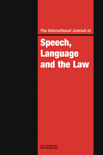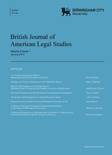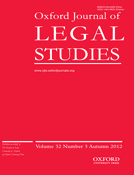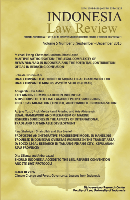
International Journal of Speech Language and the Law
Scope & Guideline
Exploring the Nexus of Language and Law
Introduction
Aims and Scopes
- Forensic Linguistics and Legal Language:
The journal emphasizes the study of language in legal contexts, including forensic linguistics, where language analysis aids in legal investigations and court proceedings. - Multilingualism and Language Rights:
A core area of focus is on the implications of multilingualism within legal frameworks, examining language rights and how these affect fair trial rights and accessibility in diverse linguistic contexts. - Discourse Analysis in Legal Settings:
The journal applies discourse analysis to understand courtroom interactions, legal documents, and the language used by legal professionals, contributing to a deeper comprehension of legal discourse. - Cultural and Contextual Variability:
Research often explores how cultural differences impact language use in legal settings, including the effects of language on perceptions of justice and legal outcomes. - Technological Advances in Language Analysis:
The journal incorporates studies on new methodologies and technologies, such as automatic speaker recognition and computational linguistics, to analyze language in legal contexts.
Trending and Emerging
- Digital Communication and Cybercrime:
There is a noticeable increase in research focusing on language use in digital communication, particularly in the context of cybercrime, reflecting the changing landscape of crime and the importance of language in online interactions. - Impact of Language on Legal Processes:
Emerging studies are increasingly examining how language affects perceptions of fairness and justice in legal proceedings, highlighting the role of language in shaping legal outcomes. - Cultural and Linguistic Diversity in Legal Settings:
Recent papers have begun to explore the implications of cultural and linguistic diversity more deeply, particularly in relation to fair trial rights and the experiences of non-native speakers in legal contexts. - Interdisciplinary Approaches to Legal Linguistics:
There is a growing trend towards interdisciplinary studies that combine insights from linguistics, law, psychology, and technology, indicating a broader approach to understanding language in legal contexts.
Declining or Waning
- Traditional Legal Interpretations:
There appears to be a waning interest in conventional interpretations of legal texts without considering the influence of language, context, or cultural nuances, as newer research emphasizes more dynamic and context-sensitive analyses. - Historical Linguistic Studies in Law:
Research focusing on historical linguistics and its applications in legal texts has been less prominent, suggesting a move towards contemporary issues and real-time applications of language in law. - Static Language Rights Frameworks:
Previous frameworks that explored static views on language rights are becoming less common, as the journal increasingly focuses on dynamic interactions and evolving language rights in multicultural societies.
Similar Journals

British Journal of American Legal Studies
Unlocking Access to Cutting-Edge American Legal ResearchBritish Journal of American Legal Studies is a dynamic open-access journal published by SCIENDO, focusing on the intricate and evolving landscape of American legal studies. Since its inception in 2016, this journal has aimed to provide a platform for the dissemination of research that enhances understanding of U.S. law in a global context, promoting interdisciplinary dialogue among legal scholars, practitioners, and policy-makers. With an ISSN of 2049-4092 and an E-ISSN of 2719-5864, the journal holds a Q4 category in Law according to the 2023 rankings, reflecting its commitment to nurturing legal scholarship despite being positioned in the lower quartile among its peers. The journal's presence in Scopus, ranked #927 out of 1025 in the Social Sciences _ Law category with a percentile of 9th, demonstrates its emerging role in the field. As an open access publication, it is dedicated to making research freely available to ensure that findings and discussions reach a broader audience. The British Journal of American Legal Studies is not only instrumental for researchers and students keen on American law but also serves as an essential resource for professionals looking to stay informed about current legal challenges and developments.

CRIMINAL LAW JOURNAL
Advancing the discourse in criminal law.CRIMINAL LAW JOURNAL, published by LAWBOOK CO LTD, serves as a critical resource for legal practitioners, scholars, and students in the field of criminal law. With a dedicated focus on advancing the understanding of legal principles, case law, and statutory developments, this journal provides insightful articles, case analyses, and commentary from leading experts. Although it does not currently offer Open Access options, its rigorous peer-review process ensures the publication of high-quality research pertinent to contemporary issues in criminal law. The journal aims to foster academic discourse and promote best practices within the legal community. By maintaining a strong commitment to legal scholarship and education, the CRIMINAL LAW JOURNAL stands as a prominent platform for disseminating vital knowledge that influences policy-making and legal reform.

Revista Juridica Portucalense
Advancing Legal Discourse in a Dynamic WorldRevista Juridica Portucalense, published by the Universidade Portucalense Infante D Henrique Cooperativa de Ensino Superior in Portugal, stands as an influential peer-reviewed journal focusing on the fields of Law, Political Science, and Sociology. With an ISSN of 2183-5799 and an E-ISSN of 2183-5705, this Open Access journal has made significant strides in promoting scholarly research and academic discourse since its launch in 2014. The journal is categorized in the Q3 quartile for 2023 across its respective disciplines, highlighting its growing impact within the academic community, despite its current H-index rating still being unestablished. With a Scopus ranking pointing to its dedication to quality scholarship—ranked #724/1025 in Law and maintaining a presence in Political Science and Sociology—Revista Juridica Portucalense is an indispensable resource for researchers, practitioners, and students alike who are eager to engage with contemporary legal issues and the interplay of political and social dynamics.

Jurnal Cita Hukum-Indonesian Law Journal
Illuminating the Path of Indonesian Legal Research.Jurnal Cita Hukum-Indonesian Law Journal, with ISSN 2356-1440 and E-ISSN 2502-230X, is a prestigious open-access journal published by UNIV ISLAM NEGERI SYARIF HIDAYATULLAH JAKARTA. Since its inception in 2013, this journal has become a critical platform for the dissemination of legal scholarship in Indonesia, addressing crucial topics in Indonesian law and its applications within the broader Southeast Asian context. The journal's commitment to accessibility ensures that research findings are readily available to a wide audience, promoting knowledge-sharing among researchers, legal professionals, and students alike. As it continues to forge new avenues of inquiry in legal studies, Jurnal Cita Hukum plays a significant role in enhancing the understanding and development of law in Indonesia, making it an invaluable resource for those committed to advancing legal scholarship and practice.

Oxford Journal of Legal Studies
Transforming Legal Research into Impactful KnowledgeThe Oxford Journal of Legal Studies, published by Oxford University Press, stands as a prestigious platform for scholarly discourse within the field of law. Renowned for its impactful contributions to legal scholarship since its inception in 1981, this journal has established itself in the top tier of its category, currently classified as Q1 in Law based on the 2023 category quartiles. With its ISSN 0143-6503 and E-ISSN 1464-3820, the journal provides a comprehensive exploration of contemporary legal issues, theoretical perspectives, and empirical research, attracting contributions from leading academics and practitioners alike. Residing within the Social Sciences arena, it holds an impressive rank of 194/1025, landing it in the 81st percentile according to Scopus rankings. Though not currently an open-access publication, the Oxford Journal of Legal Studies remains vital for researchers, professionals, and students eager to deepen their understanding of legal frameworks and contemporary challenges within the legal landscape. Located in the heart of the United Kingdom, at Great Clarendon St, Oxford OX2 6DP, England, the journal is an indispensable resource for those advancing the study and practice of law.

Indonesia Law Review
Empowering Legal Minds Through Open Access ResearchIndonesia Law Review is a premier open-access academic journal dedicated to advancing knowledge in the fields of law and social sciences, with particular emphasis on the Indonesian legal landscape. Established by the Indonesian Law Review, this journal has made significant strides since becoming open access in 2014, ensuring that research is freely available to a global audience. Based in Depok, West Java, the journal seeks to foster scholarly discourse on legal issues pertinent to Indonesia, while also contributing to the broader field of education and social sciences. With its current Scopus rankings placing it within the top tiers of law and social sciences, including a Q3 categorization in law and a Q4 classification in education and miscellaneous social sciences, the **Indonesia Law Review** serves as a vital platform for researchers, professionals, and students to disseminate their findings and engage with contemporary legal dilemmas. The journal is committed to providing a robust forum for innovative legal scholarship and is an essential resource for anyone seeking to understand the complexities of law in Indonesia and beyond.

Law Text Culture
Illuminating the Cultural Dimensions of Legal Discourse.Law Text Culture is a pioneering academic journal published by the University of Wollongong, Australia, and is dedicated to the interdisciplinary exploration of law, text, and culture. With its mission to foster innovative scholarly inquiry, this journal serves as a vital platform for researchers, practitioners, and students interested in the intersection of legal studies, literature, and cultural analysis. The journal's ISSN is 1322-9060 and its E-ISSN is 2200-7121. Although currently not an open access journal, it aims to contribute significantly to academic discourse, inviting submissions that critique and elucidate the complex relationships between legal frameworks and cultural narratives. As a resource with the potential for high scholarly impact, Law Text Culture is positioned to address key contemporary issues facing the legal profession and its representation in various textual forms.

Law & Practice of International Courts and Tribunals
Navigating the Complexities of International Legal FrameworksLaw & Practice of International Courts and Tribunals is a prestigious academic journal published by BRILL, focusing on the interplay between international law and the functioning of international courts and tribunals. Since its inception in 2007, the journal has established itself as a crucial platform for scholarly discourse, achieving a Q1 ranking in Law and notable placements in categories such as Political Science and Sociology. With a commitment to advancing knowledge, it serves researchers, practitioners, and students alike, facilitating a deeper understanding of the legal frameworks that govern international adjudication. Despite its non-open access model, the journal's content is highly regarded for its rigorous peer-reviewed articles, which lend critical insights into evolving legal practices and cultural dialogues within the international legal community.

Rasprave
Fostering academic discourse in linguistics and language studies.Rasprave is a distinguished open access journal published by the Institute of Croatian Language and Linguistics in Croatia, dedicated to advancing the field of linguistics and language studies. With an ISSN of 1331-6745 and E-ISSN 1849-0379, the journal has embraced open access since 2007, making its research widely available to scholars globally. It holds an important position in the academic community, particularly noted for its 2023 Scopus ranking within the Arts and Humanities and Social Sciences categories, falling into the 59th and 56th percentiles respectively. The journal’s impact is further reflected in its Q3 quartile ranking in linguistic and language studies, showcasing its relevance and growing influence in this vibrant field. Rasprave aims to publish innovative research that deepens understanding of language dynamics, linguistic theory, and sociolinguistics, making it an essential resource for researchers, professionals, and students seeking to enrich their knowledge and contribute to the academic discourse surrounding language.

Lexonomica
Fostering Dialogue in Contemporary Legal StudiesLexonomica is an influential academic journal published by UNIV MARIBOR, FAC LAW, dedicated to the field of legal studies and its intersections with socio-economic issues. With a commitment to fostering scholarly communication, Lexonomica offers a platform for researchers, practitioners, and students to disseminate their findings and insights on contemporary legal matters, policy analysis, and theoretical developments. Although currently not an open access journal, it plays a pivotal role in contributing to the academic dialogue within the legal community, as evidenced by its unique ISSN (1855-7147) and E-ISSN (1855-7155). The journal aspires to promote high-quality research and facilitate the understanding of legal phenomena in a globalized context, underlining its importance for those seeking to engage critically with the law in an ever-evolving landscape. The journal's address is located in beautiful Maribor, Slovenia, symbolizing a rich tradition of legal education and research.